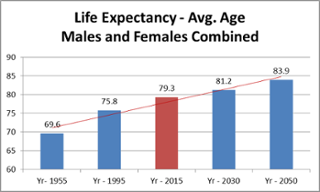 I just read an interesting blog by Avivah Wittenberg Cox, CEO of 20-first, that openly raised the question about what career management and retirement will look like as life expectancy continues to increase.
I just read an interesting blog by Avivah Wittenberg Cox, CEO of 20-first, that openly raised the question about what career management and retirement will look like as life expectancy continues to increase.
Her point is that it can no longer be assumed that a person will have a 30 to 40 year career and then retire to spend their remaining days in relaxation and non-activity.
Diminished retirement savings, better health and lifelong learning has altered this thinking and changed career management moving forward.
The actuarial facts of the past led to the belief that someone could comfortably retire at 65 and then spend their remaining short years in comfort. The chart below shows how the average life expectancy in the United State for men and women combined has steadily grown.

Source: www.data360.org
Back in 1955 the average life was just under 70 years. This meant that the average retiree had about five years in retirement. Currently, the average retiree (retiring at age 65) in 2015 has about fourteen years in retirement. Looking forward to 2055 the average retiree will have almost nineteen years in retirement.
This indicates that the average person can now expect to have a meaningful number of years in some sort of post retirement from the first (or second – or third – etc.) career.
To add to this analysis, consider the following provided by Avivah Wittenberg Cox:
“For more, I looked to a book by Lynda Gratton and Andrew Scott, two London Business School professors, called The 100 Year Life.
Half the children born today, they say, have a 50% chance of living to 105.
That’s up from only 1% a century ago.”
This then leads to what is an effective career management strategy as we age?
Wittenberg Cox, in her smart blog titled “What Happens When Career Last 20 Years Longer?” talks about how longer lives will lead to more career reinvention.
“For individuals, longer lives will mean that we are likely to reinvent ourselves many times over. We will want to learn to re-learn and be open to repetitive re-training.
Lifelong learning will become an essential part of adult development.”
I believe, this type of reinvention will lead to a significant redefinition of what “retirement” means. Retirement, as a commonly known term and status, will be redefined into a more active learning phase where individuals will seek to leverage their knowledge and skills in such a way that it will lead them into an entirely new career phase.
There will still be a sizable number of people who will select to have the traditional retirement lifestyle of non-work and leisure pursuits but the percentage of the maturing population who will continue to work, redefine their careers and explore something new will become a greater and greater segment of the over 65 population.
To quote Wittenberg Cox:
“As people age more healthily and work longer, the 50s and 60s will emerge as creative new decades of renewal, mobility and wisdom. Aging societies may not be the sad and boring future everyone fears. They may be an innovative and promising reinvention of human potential. Smart companies are already working to make their talent management approaches more flexible, shifting away from the “ladder” and allowing individuals more say in crafting alternative paths along a “lattice.”
![]()



